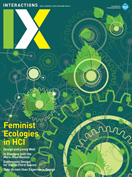Authors:
Elizabeth Churchill, Mikael Wiberg
In this issue we foreground feminist ecologies in HCI. Accordingly, we take a relational approach to thinking about feminism as a collective movement, but also as a shared long-term struggle. Indeed, communal belonging, collective efforts, and an ability to move forward together might be more important than ever. As highlighted by guest editors Gopinaath Kannabiran and Marie Louise Juul Søndergaard in their introduction, researchers in our community have pointed out that computer technology is often designed based on the intuition, knowledge, and values of people who are WEIRD—Western, educated, industrialized, rich, and democratic—and how "any claim about designing technology for ecological responsibility requires us to critically examine how ecological responsibility is geopolitically negotiated, discursively operationalized, and ethically justified based on specific values and priorities." We are all invited to reflect on our current practices, on whose voices are included and whose are not, and on how we can more effectively represent diversity in thinking and in design practice.
There is an increasing need for an ecologically focused responsibility, and in HCI we can now see how this is unfolding across the design discourse of our field—in both research and practice. We see it unfolding through feminist approaches to design knowledge production, which foreground our bodies as part of our object of study in HCI, and in the increasing interest in more-than-human approaches to design and HCI. What brings all of these efforts together is not only a shared concern but also a shared vision for alternative and better futures—established through critical examinations, debates, efforts of making and unmaking, and collective standpoints.
Feminist ecologies is both a design space and a discursive space—an opportunity to rethink the past and an opportunity to imagine alternative futures.
Feminist ecologies is simultaneously a call for rethinking and a call for moving forward. This call includes feminist-informed approaches for ecologically responsible technology design, as well as a critical examination of what brought us to this point in time. Feminist ecologies is accordingly both a design space and a discursive space—an opportunity to rethink the past and an opportunity to imagine alternative futures.
We see this issue of Interactions as an acknowledgment of this movement in our field, and as a call for more critical conversations. Contributors pushing these conversations forward include Ann Light, with a discussion of "affective prefiguration"; Nadia Campo Woytuk and Marie Louise Juul Søndergaard, with a piece linking menstrual care and environmental care; and Anton Poikolainen Rosén, Vasanth Madhav Kamath, and Gopinaath Kannibiran, whose "soil dialogue" uses soil samples as a jumping-off point for a discussion about sustainability from a feminist perspective. Deepa Singh and Kay Kender reflect on ecofeminist design for digital third spaces, while Heather McKinnon and Gopinaath Kannabiran have a conversation on design and living well. Adding critical takes are regular columnists Jonathan Bean and Jaz Hee-jeong Choi.
We also have a number of other contributions. Kyle Boyd and colleagues discusses the design of discreet user interfaces. Rae Yule Kim shares a perspective on data-driven user experience design. Niels van Berkel and Kasper Hornbæk address the role of theory in HCI. All of these articles underscore our community's shared interest in interactive technologies and design, and point to the underlying design and engineering of the platforms that are increasingly entangled in our everyday lives. As the new co-editors-in-chief for ACM Interactions, we are honored to bring this issue to you. We thank past co-EICs Daniela Rosner and Alex Taylor, and also our guest editors Gopinaath and Marie Louise for steering much of the content you will read here. In the next issue, we will expand on our future directions, but in the meantime: Welcome to this themed issue on feminist ecologies in HCI!
Elizabeth Churchill and Mikael Wiberg
[email protected]
Copyright held by authors
The Digital Library is published by the Association for Computing Machinery. Copyright © 2023 ACM, Inc.








Post Comment
No Comments Found